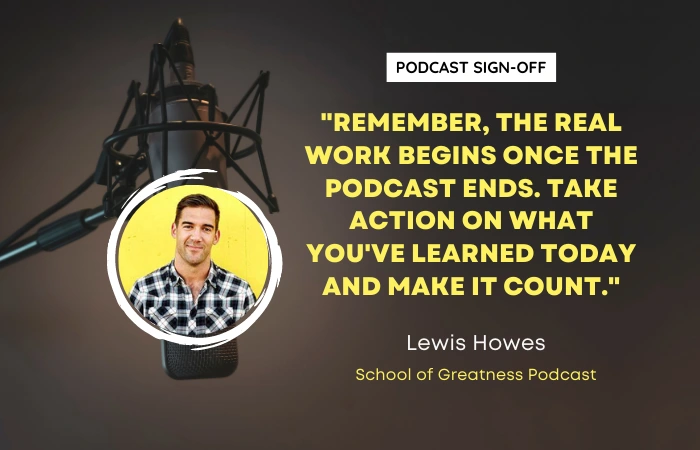Have you ever thought about why endings matter so much?
Endings have the power to leave a lasting impression on us, to evoke strong emotions, and to convey important messages. That’s why understanding how to craft effective and satisfying endings is essential in various aspects of our lives, from storytelling to personal relationships.
In this article, we’re going to examine the different types of endings and why they’re important. We’ll learn about the emotional impact that endings can have on us, and how those emotions can make or break your relationship with your podcast audience.
Before you assume that a good podcast ending is the quintessential “sign off” like Walter Cronkite’s famous, “And that’s the way it is”, consider the fact that that ending served its purpose, not your purpose. It resonated with the audience at the time because it gave the impression that the news was facts and figures and nothing more. No opinions. No fearmongering. It was just the way it is and there was comfort in that.
Your ending must convey what your audience needs as well. Crafting an effective ending requires careful consideration of its overall purpose and the message you must convey. It’s also your final opportunity to tie up loose ends, deliver on promises made, and even leave some room for interpretation.
By understanding the importance and power of endings, you can learn to use them to your advantage in not just your podcasting, but in every aspect of life.
Endings can help us communicate important messages, evoke emotions, and leave a lasting impression on those around us. So, the next time you’re writing a story or having a difficult conversation, remember the power of endings and how they can help you achieve your goals.
Different Types of Endings
Have you ever thought about the different types of endings? There are various ways to end a story or experience, and each type of ending can have a different impact on the audience. Let’s go over your options and purpose behind each type of ending.
The first type of ending is the “closed” ending, which ties up all loose ends and provides a sense of resolution. This type of ending is common in detective stories and mysteries, where the culprit is revealed and justice is served. An example of a closed ending is the conclusion of Agatha Christie’s “Murder on the Orient Express,” where the detective reveals the identity of the murderer and ties up all loose ends.
The second type of ending is the “open” ending, which leaves some elements of the story unresolved or open to interpretation. This type of ending can be used to create a sense of ambiguity or to encourage the audience to think critically about the story’s themes and messages. An example of an open ending is the conclusion of the movie “Inception,” where the protagonist’s fate is left uncertain and open to interpretation.
The third type of ending is the “circular” ending, which brings the story full circle and ends where it began. This type of ending can be used to create a sense of closure and to emphasize the cyclical nature of life. An example of a circular ending is the conclusion of the novel “The Catcher in the Rye,” where the protagonist returns to his childhood home and reflects on the experiences that led him there.
Understanding the different types of endings can help storytellers and writers, and podcasters like yourself, choose the right ending for the story and create a more impactful experience for the audience.
An audience that is engaged and feels rewarded in the end for sticking with your content through its conclusion, has a far higher chance of coming back and listening to your podcast again. These are your subscribers!

Emotional Impact of Endings
Endings have the power to move us in ways that few other things can. From books and movies to personal experiences, endings can evoke strong emotions in us, from joy and satisfaction to sadness and grief. A well-crafted ending can leave us feeling fulfilled and uplifted, or alternatively, it can leave us feeling heartbroken or reflective.
One of the reasons why endings have such a profound emotional impact on us is that they can provide a sense of catharsis, a release of emotions and a feeling of closure. A satisfying ending can give us a sense of relief and closure, while an unsatisfying one can leave us feeling unresolved and disappointed.
In addition to their emotional impact, endings can also be used to convey important messages and themes. A powerful ending can leave a lasting impression on us and can be used to highlight the central message or moral of a story. For example, the ending of “To Kill a Mockingbird” emphasizes the importance of compassion and understanding, while the ending of “The Shawshank Redemption” highlights the importance of hope and perseverance.
Overall, understanding the emotional impact of endings is crucial in crafting a powerful and effective story. By recognizing how endings can evoke emotions and convey important messages, we can create more impactful and meaningful experiences for ourselves and others.
The Power of Endings
Endings are not only emotionally powerful, but can also be used to convey important meaning and messages. A well-crafted ending can leave a lasting impression on the audience and be used to highlight the central message or moral of a story.
One way endings can convey meaning is through a sense of resolution or closure. When a story or experience reaches a conclusion, it can provide a sense of closure and resolution to the events that have occurred. This can be used to convey a message about the importance of resolving conflicts or finding closure in our own lives.
Another way endings can convey meaning is through a twist or surprise ending. A twist ending can provide a new perspective or change the audience’s perception of the events that have occurred. This can be used to convey a message about the unpredictability of life or the importance of considering different perspectives.

Endings can also be used to leave a lasting impression on the audience. A powerful and memorable ending can be used to reinforce the central message or moral of a story, leaving the audience with a strong impression and encouraging them to reflect on the experience long after it has ended.
A great ending has the potential to be much more than just the conclusion of a story or experience. They can be used to convey important meaning and messages, providing a sense of resolution or closure, presenting a twist or surprise ending, or leaving a lasting impression on the audience. By recognizing the potential of endings to convey meaning, we can create more impactful and meaningful experiences for ourselves and others.
Examples of Endings That Leave An Impression
There are countless examples of powerful endings in literature, movies, and TV shows that demonstrate the potential for endings to convey meaning and messages.
Here are a few examples of impressionable endings that most of us have experienced:
- The ending of “The Great Gatsby” by F. Scott Fitzgerald: In this novel, the protagonist, Jay Gatsby, dies tragically, but his legacy lives on. The final lines of the novel emphasize the themes of hope, dreams, and the relentless pursuit of the American Dream, even in the face of adversity.
- The ending of “Breaking Bad”: This popular TV series concludes with the main character, Walter White, dying alone in a meth lab. However, before he dies, he fulfills his mission to provide for his family after his death, and he makes amends with his estranged partner, Jesse. The ending highlights the consequences of one’s choices and the importance of redemption.
- The ending of “The Shawshank Redemption”: In this movie, the protagonist, Andy Dufresne, escapes from prison and finds redemption by helping his friend, Red, to also escape and start a new life. The ending emphasizes the themes of hope, perseverance, and the power of friendship.
These examples demonstrate the power of endings to convey important themes and messages. By crafting an impactful and meaningful ending, storytellers can leave a lasting impression on their audience and reinforce the central message or moral of their story.
Podcast Endings
This may surprise you, but podcasts are a unique form of media where endings play a significant role. Unlike TV shows or movies, podcasts have no set runtime or structure. Listeners can choose to stop listening at any time, which means it’s essential to create a compelling ending that keeps them engaged until the very last second. You must give them a pay-off for their listening loyalty!
One of the essential aspects of podcasting is building a loyal audience, and strong endings are a crucial factor in achieving that goal. A well-crafted ending can leave a lasting impression on the listener and prompt them to return for future episodes.
In addition to keeping the listener engaged, a strong ending can also convey a clear message or call-to-action. Podcasters can use the ending to ask for feedback, encourage listeners to subscribe or leave a review, or promote upcoming episodes.

Crafting a powerful podcast ending requires the same careful consideration as any other type of storytelling. The ending should reflect the podcast’s purpose, evoke emotion, and leave a lasting impact on the listener. By mastering the art of endings, you can create a loyal fan base that eagerly anticipates each new episode and enjoys an unforgettable listening experience.
Let’s take a look at how to craft that all-powerful ending that your audience is going to love.
Crafting Endings
A well-crafted ending can leave a lasting impression on the audience, reinforce the central message or moral of a story, and provide a sense of closure or resolution.
Crafting Satisfying Endings: Tips and Techniques from the Pros
- Know the purpose of the ending: Before crafting an ending, it’s important to understand the purpose of the story or experience. What message or moral are you trying to convey? What emotional response do you want to elicit from the audience? Knowing the purpose of the ending can help guide your creative decisions and ensure that the ending is effective and meaningful.
- Build towards the ending: A satisfying ending should feel like a natural conclusion to the events that have occurred. It’s important to build towards the ending throughout the story or experience, providing clues or foreshadowing that lead up to the conclusion. This can help make the ending feel satisfying and meaningful, rather than forced or abrupt.
- Consider the emotional impact: Endings can be emotionally powerful, and it’s important to consider the emotional impact of the ending on the audience. What emotional response do you want to elicit? Do you want the audience to feel sad, happy, hopeful, or surprised? By considering the emotional impact of the ending, you can create a more impactful and meaningful experience for the audience.
- Take risks: Sometimes the most memorable and impactful endings are the ones that take risks. Consider unconventional or unexpected endings that challenge the audience’s expectations and provide a unique perspective on the story or experience.
By understanding the purpose of the ending, building towards the conclusion, considering the emotional impact, and taking risks, you can create satisfying endings that leave a lasting impression on the audience and convey important messages or themes.

Podcasters Known For Well-Crafted Endings
Here are a few podcasters known for their great endings:
- Ira Glass from This American Life: Ira Glass is known for his masterful storytelling abilities, and he often ends his episodes with a poignant reflection or a thought-provoking insight.
- Jad Abumrad and Robert Krulwich from Radiolab: Radiolab is a podcast that explores big ideas in science and philosophy, and the show’s hosts, Jad and Robert, are skilled at weaving together complex concepts into a cohesive and satisfying conclusion.
- Sarah Koenig from Serial: Serial is a true-crime podcast that tells a single story over the course of a season, and host Sarah Koenig has a knack for leaving listeners on the edge of their seats with each episode’s cliffhanger ending.
- Dan Carlin from Hardcore History: Hardcore History is a podcast that dives deep into historical events and figures, and host Dan Carlin is known for his ability to bring these stories to life and leave listeners with a sense of awe and wonder.
- Terry Gross from Fresh Air: Terry Gross is a master interviewer, and she often ends her interviews with a thoughtful reflection or a surprising revelation that leaves listeners with a new perspective on the topic at hand.
These are just a few examples, but there are many other great podcasters out there who are skilled at crafting engaging endings to their episodes, and there’s no reason you can’t become one of them!
The Ending of This Article
If this article has served its purpose, you know that endings are a crucial part of storytelling and a critical part of the human experience.
They can be emotional, impactful, and unforgettable. Endings can take on different forms and convey a variety of messages; some are happy, some are sad, and some are ambiguous, but they all serve a purpose.
Crafting effective endings requires careful consideration of the story or experience’s purpose, building towards the conclusion, taking risks, and considering the emotional impact. By understanding the importance of endings, we can become better storytellers and better equipped to navigate the endings in our own lives.
So, I encourage you to take a moment and think about the endings in your own life. What do they mean to you? How have they affected you? By reflecting on our own endings, we can gain a deeper understanding of ourselves and the world around us. Let’s embrace the power of endings and use them to create meaningful experiences, both in our stories and in our lives.





